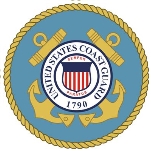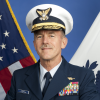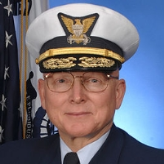The United States Coast Guard (USCG), under the Department of Homeland Security, is one of the five branches of the U.S. Armed Services, with a variety of functions at U.S. ports, coasts and inland waterways, as well as in international waters. Today, the Coast Guard’s peacetime roles include patrolling borders, enforcing licenses, protecting the environment, maintaining waterways, conducting rescue operations, inspecting vessels for safety and stemming the flow of drugs and other contraband into the United States. In times of war, the Coast Guard can be called upon to augment the other military services. The USCG’s budgets increased substantially following the Sept. 11 terrorist attacks, as it placed greater emphasis on homeland security missions.
- The largest peacetime Coast Guard operation occurred in 1980. An economic downturn and resulting tensions in Cuba led its government to declare that anyone who wanted to emigrate could do so. Cuban-Americans organized hundreds of small vessels, which left Miami for Mariel, Cuba, where they picked up émigrés before attempting to return home. The number of people on many of the vessels exceeded their design limits, and the Coast Guard had to mobilize resources from all over the East Coast to help them. By the time the Mariel Boatlift - as it came to be called - was over, some 125,000 Cubans had found their way to the U.S. mainland. Only 27 died at sea.
- One of the major responsibilities of the modern-day Coast Guard is protecting the marine environment; it currently does so under the auspices of the Clean Water Act. The Coast Guard also leads efforts to clean up oil spills. The Exxon Valdez disaster resulted in the passage of the Oil Pollution Act of 1990, which the Coast Guard is partly responsible for enforcing.
- A month after the Sept. 11 terrorist attacks, members of Congress from both major parties proposed the creation of a cabinet-level Department of Homeland Security. Initially, President George W. Bush opposed the idea, but on June 6, 2002, he finally reversed his position. Bush also proposed that a number of already-existing federal agencies, including the Coast Guard, be placed under the authority of the nascent department. On Feb. 25, 2003, Transportation Secretary Norman Mineta officially ceded control of the service to Homeland Security Secretary Tom Ridge. The transportation secretary had been the civilian leader of the Coast Guard for nearly 36 years. As a result of the transfer, issues relating to homeland security became USCG’s prime focus (see links below).
- The Coast Guard sent teams to restore ports following Hurricane Katrina, allowing nearly unrestricted shipping to resume some two weeks after the storm made landfall.
- A new Deployable Operations Group was launched in the summer of 2007, bringing specialized forces under one command for coordinated use with other agencies in specific emergencies or tactical situations. The group is headed by Rear Adm. Thomas F. Atkin.
- Port, Waterway and Coastal Security - Conducts patrols, gathers and analyzes intelligence, and assesses vulnerabilities in order to thwart terrorist attacks. Also maintains territorial integrity.
- Defense Readiness - Takes part in military operations worldwide, generally in support positions.
- Illegal Immigration Control - Uses ships and aircraft to intercept and detain illegal immigrants who are traveling by water.
- Search and Rescue - Maintains emergency-response stations and a communication system for helping those in distress.
- Aids to Navigation - Manages and monitors U.S. waterways, making sure traffic flows in a safe and efficient manner.
- Living Marine Resources - Enforces domestic fishing laws through patrols and inspections.
- Ice Operations - Helps transport goods and personnel in connection with scientific and national security efforts in polar regions. Also breaks through ice with specialized ships and keeps track of icebergs to help direct commercial vessels.
- Marine Safety - Sets safety standards and inspects commercial vessels to ensure those standards are being maintained.
- Marine Environmental Protection - Prevents and responds to oil and chemical spills, stops illegal dumping in U.S. waters and works to curtail the proliferation of invasive plant and animal species.
- Illegal Drug Interdiction - Uses sea vessels and aircraft to intercept illegal drug shipments and collect intelligence.
- Fish Stock Protection - Ensures foreigners don’t raid U.S. fish stocks.
- Table of Contents
- Overview
- History
- What it Does
- Where Does the Money Go
- Controversies
- Suggested Reforms
- Comments
- Leave a comment


Admiral Paul Zukunft took over as Commandant of the U.S. Coast Guard on May 30, 2014. He is the 25th person to hold that position.
Zukunft was born January 30, 1955, in New Haven, Conn., and grew up in nearby North Branford. He stayed near home as he attended the Coast Guard Academy in New London, Conn., graduating in 1977 with a B.S. in government. Zukunft subsequently earned an M.A. in management from Webster University in 1988 and an M.A. in national security and strategic studies from the Naval War College in 1997.
After having been in the Coast Guard only three years, Zukunft commanded a 95-foot boat, the Cape Upright, as the Mariel boatlift was going on. At one point Zukunft and his crew took 200 people off a leaky 60-foot boat making its way to Florida. During his career, Zukunft also commanded the cutters Rush and Harriet Lane, and served as chief of staff at the Fourteenth Coast Guard District in Honolulu, Hawaii. Other assignments included Chief of Operations for the Coast Guard Pacific Area and Chief of Operations Oversight for the Coast Guard Atlantic Area.
In 2008, Zukunft took over as commander of the 11th Coast Guard District, which comprises California, Arizona, Nevada and Utah. Two years later, he was made federal on-scene coordinator of the BP oil spill cleanup in the Gulf of Mexico under National Incident Commander Admiral Thad Allen.
Zukunft then served as commander of the Coast Guard’s Pacific Area, which stretches from the Rockies west to the east coast of Africa.
As Commandant, Zukunft has pushed for the Coast Guard to acquire new ships, including an Offshore Patrol Cutter, which would be suitable for sailing in the worst weather, and additional icebreakers. The service’s only operational heavy icebreaker, the Polar Star, is 40 years old and prone to breakdowns. Zukunft is concerned that if the Polar Star were to break down in the middle of the icepack, there would be no way to rescue the ship.
Zukunft’s wife, Fran, is a former pharmaceutical sales rep. They have one son, and Zukunft has two daughters from an earlier marriage.
-Steve Straehley
To Learn More:
Official Biography (pdf)

The United States Coast Guard (USCG), gained a new leader on May 25, 2010, when Commandant of the Coast Guard Thad Allen finished his four-year tour in the post. President Obama chose Coast Guard Vice Admiral Robert A. Papp to be next Commandant. The Coast Guard, which operates under the Department of Homeland Security during peacetime and can be transferred to the Department of the Navy during wartime, has about 42,000 active-duty men and women and 7,000 civilian employees. The USCG’s budget has increased substantially since the September 11, 2001, terrorist attacks, and it has become a key player in addressing some of the nation’s most complex security problems, including international smuggling and terrorism.
- Latest News
- D.C. Public Schools will Teach all Second-Graders to Ride a Bike
- New Rule in Germany Limits Sales of Sex-Themed E-Books to 10pm to 6am
- What Happened to the 6-Year-Old Tibetan Boy the Chinese Government Kidnapped 20 Years Ago?
- U.S. Ambassador to Turkey Photoshops his Hair Color to Mock Turkish Mayor
- Mystery Artist Calls Attention to Unfixed Potholes by Drawing Penises around Them
The United States Coast Guard (USCG), under the Department of Homeland Security, is one of the five branches of the U.S. Armed Services, with a variety of functions at U.S. ports, coasts and inland waterways, as well as in international waters. Today, the Coast Guard’s peacetime roles include patrolling borders, enforcing licenses, protecting the environment, maintaining waterways, conducting rescue operations, inspecting vessels for safety and stemming the flow of drugs and other contraband into the United States. In times of war, the Coast Guard can be called upon to augment the other military services. The USCG’s budgets increased substantially following the Sept. 11 terrorist attacks, as it placed greater emphasis on homeland security missions.
- The largest peacetime Coast Guard operation occurred in 1980. An economic downturn and resulting tensions in Cuba led its government to declare that anyone who wanted to emigrate could do so. Cuban-Americans organized hundreds of small vessels, which left Miami for Mariel, Cuba, where they picked up émigrés before attempting to return home. The number of people on many of the vessels exceeded their design limits, and the Coast Guard had to mobilize resources from all over the East Coast to help them. By the time the Mariel Boatlift - as it came to be called - was over, some 125,000 Cubans had found their way to the U.S. mainland. Only 27 died at sea.
- One of the major responsibilities of the modern-day Coast Guard is protecting the marine environment; it currently does so under the auspices of the Clean Water Act. The Coast Guard also leads efforts to clean up oil spills. The Exxon Valdez disaster resulted in the passage of the Oil Pollution Act of 1990, which the Coast Guard is partly responsible for enforcing.
- A month after the Sept. 11 terrorist attacks, members of Congress from both major parties proposed the creation of a cabinet-level Department of Homeland Security. Initially, President George W. Bush opposed the idea, but on June 6, 2002, he finally reversed his position. Bush also proposed that a number of already-existing federal agencies, including the Coast Guard, be placed under the authority of the nascent department. On Feb. 25, 2003, Transportation Secretary Norman Mineta officially ceded control of the service to Homeland Security Secretary Tom Ridge. The transportation secretary had been the civilian leader of the Coast Guard for nearly 36 years. As a result of the transfer, issues relating to homeland security became USCG’s prime focus (see links below).
- The Coast Guard sent teams to restore ports following Hurricane Katrina, allowing nearly unrestricted shipping to resume some two weeks after the storm made landfall.
- A new Deployable Operations Group was launched in the summer of 2007, bringing specialized forces under one command for coordinated use with other agencies in specific emergencies or tactical situations. The group is headed by Rear Adm. Thomas F. Atkin.
- Port, Waterway and Coastal Security - Conducts patrols, gathers and analyzes intelligence, and assesses vulnerabilities in order to thwart terrorist attacks. Also maintains territorial integrity.
- Defense Readiness - Takes part in military operations worldwide, generally in support positions.
- Illegal Immigration Control - Uses ships and aircraft to intercept and detain illegal immigrants who are traveling by water.
- Search and Rescue - Maintains emergency-response stations and a communication system for helping those in distress.
- Aids to Navigation - Manages and monitors U.S. waterways, making sure traffic flows in a safe and efficient manner.
- Living Marine Resources - Enforces domestic fishing laws through patrols and inspections.
- Ice Operations - Helps transport goods and personnel in connection with scientific and national security efforts in polar regions. Also breaks through ice with specialized ships and keeps track of icebergs to help direct commercial vessels.
- Marine Safety - Sets safety standards and inspects commercial vessels to ensure those standards are being maintained.
- Marine Environmental Protection - Prevents and responds to oil and chemical spills, stops illegal dumping in U.S. waters and works to curtail the proliferation of invasive plant and animal species.
- Illegal Drug Interdiction - Uses sea vessels and aircraft to intercept illegal drug shipments and collect intelligence.
- Fish Stock Protection - Ensures foreigners don’t raid U.S. fish stocks.
Comments


Admiral Paul Zukunft took over as Commandant of the U.S. Coast Guard on May 30, 2014. He is the 25th person to hold that position.
Zukunft was born January 30, 1955, in New Haven, Conn., and grew up in nearby North Branford. He stayed near home as he attended the Coast Guard Academy in New London, Conn., graduating in 1977 with a B.S. in government. Zukunft subsequently earned an M.A. in management from Webster University in 1988 and an M.A. in national security and strategic studies from the Naval War College in 1997.
After having been in the Coast Guard only three years, Zukunft commanded a 95-foot boat, the Cape Upright, as the Mariel boatlift was going on. At one point Zukunft and his crew took 200 people off a leaky 60-foot boat making its way to Florida. During his career, Zukunft also commanded the cutters Rush and Harriet Lane, and served as chief of staff at the Fourteenth Coast Guard District in Honolulu, Hawaii. Other assignments included Chief of Operations for the Coast Guard Pacific Area and Chief of Operations Oversight for the Coast Guard Atlantic Area.
In 2008, Zukunft took over as commander of the 11th Coast Guard District, which comprises California, Arizona, Nevada and Utah. Two years later, he was made federal on-scene coordinator of the BP oil spill cleanup in the Gulf of Mexico under National Incident Commander Admiral Thad Allen.
Zukunft then served as commander of the Coast Guard’s Pacific Area, which stretches from the Rockies west to the east coast of Africa.
As Commandant, Zukunft has pushed for the Coast Guard to acquire new ships, including an Offshore Patrol Cutter, which would be suitable for sailing in the worst weather, and additional icebreakers. The service’s only operational heavy icebreaker, the Polar Star, is 40 years old and prone to breakdowns. Zukunft is concerned that if the Polar Star were to break down in the middle of the icepack, there would be no way to rescue the ship.
Zukunft’s wife, Fran, is a former pharmaceutical sales rep. They have one son, and Zukunft has two daughters from an earlier marriage.
-Steve Straehley
To Learn More:
Official Biography (pdf)

The United States Coast Guard (USCG), gained a new leader on May 25, 2010, when Commandant of the Coast Guard Thad Allen finished his four-year tour in the post. President Obama chose Coast Guard Vice Admiral Robert A. Papp to be next Commandant. The Coast Guard, which operates under the Department of Homeland Security during peacetime and can be transferred to the Department of the Navy during wartime, has about 42,000 active-duty men and women and 7,000 civilian employees. The USCG’s budget has increased substantially since the September 11, 2001, terrorist attacks, and it has become a key player in addressing some of the nation’s most complex security problems, including international smuggling and terrorism.
- Latest News
- D.C. Public Schools will Teach all Second-Graders to Ride a Bike
- New Rule in Germany Limits Sales of Sex-Themed E-Books to 10pm to 6am
- What Happened to the 6-Year-Old Tibetan Boy the Chinese Government Kidnapped 20 Years Ago?
- U.S. Ambassador to Turkey Photoshops his Hair Color to Mock Turkish Mayor
- Mystery Artist Calls Attention to Unfixed Potholes by Drawing Penises around Them





Comments